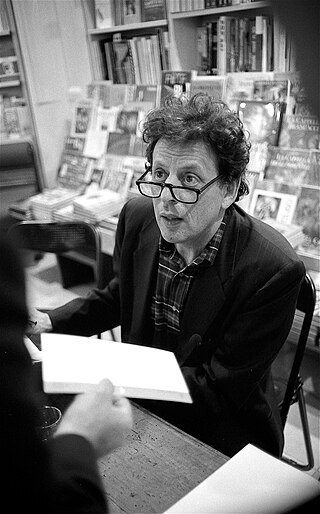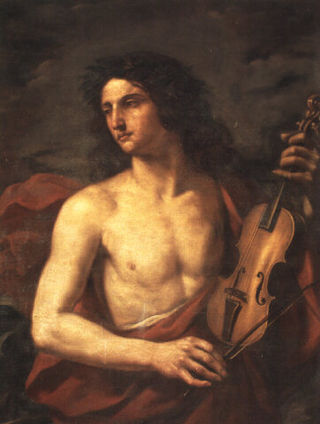
Philip Glass is an American composer and pianist. He is widely regarded as one of the most influential composers of the late 20th century. Glass's work has been associated with minimalism, being built up from repetitive phrases and shifting layers. Glass describes himself as a composer of "music with repetitive structures", which he has helped to evolve stylistically.

"In the Penal Colony" is a short story by Franz Kafka written in German in October 1914, revised in November 1918, and first published in October 1919. As in some of Kafka's other writings, the narrator in this story seems detached from, or perhaps numbed by, events that one would normally expect to be registered with horror. Internal clues and the setting on an island suggest Octave Mirbeau's The Torture Garden as an influence. The story is set in an unnamed penal colony and describes the last use of an elaborate torture and execution device that carves the sentence of the condemned prisoner on his skin as he slowly dies over the course of twelve hours. As the plot unfolds, the reader learns more and more about the machine, including its origin and original justification.

Einstein on the Beach is an opera in four acts composed by Philip Glass and directed by theatrical producer Robert Wilson, who also collaborated with Glass on the work's libretto. The opera eschews traditional narrative in favor of a formalist approach based on structured spaces laid out by Wilson in a series of storyboards which are framed and connected by five "knee plays" or intermezzos. The music was written "in the spring, summer and fall of 1975." Glass recounts the collaborative process: "I put [Wilson’s notebook of sketches] on the piano and composed each section like a portrait of the drawing before me. The score was begun in the spring of 1975 and completed by the following November, and those drawings were before me all the time."
Mabou Mines is an experimental theatre company founded in 1970 and based in New York City.
JoAnne Akalaitis is an avant-garde Lithuanian-American theatre director and writer. She won five Obie Awards for direction and was founder in 1970 of the critically acclaimed Mabou Mines in New York City.
Mary Zimmerman is an American theatre and opera director and playwright from Nebraska. She is an ensemble member of the Lookingglass Theatre Company, the Manilow Resident Director at the Goodman Theatre in Chicago, Illinois, and also serves as the Jaharis Family Foundation Professor of Performance Studies at Northwestern University.

Owen Wingrave, Op. 85, is an opera in two acts with music by Benjamin Britten and libretto by Myfanwy Piper, after a short story by Henry James. It was originally written for televised performance.
Music Theatre Wales (MTW) is a touring contemporary opera company, based in Cardiff, Wales. MTW performs newly commissioned works, alongside existing pieces from the recent past which are either neglected or have been unseen in the UK. Works are toured across the UK and internationally. Over its 22-year history MTW has performed almost 30 productions and 14 world premieres.
Susan Hilferty is an American costume designer for theatre, opera, and film.

The Io Passion is a chamber opera with music by Harrison Birtwistle and a libretto in English by Stephen Plaice. It was commissioned jointly by the Aldeburgh Festival, Almeida Opera and the Bregenz Festival in Austria.
George Michael Bartenieff was a German-born American stage and film actor. He was noted both for his character roles in commercial and non-commercial films and on television, and for his work in the avant-garde theatre and performance world of downtown Manhattan, New York City in the 1960s and 1970s. He was a co-founder of the Theatre for the New City, and of the Greenwich Village Halloween Parade.
Elena Langer is a Russian-born British composer of opera and other contemporary classical music. Her work has been performed at the Royal Opera House, Zurich Opera, Carnegie Hall, Richard B. Fisher Center for the Performing Arts, Stanislavski and Nemirovich-Danchenko Moscow Academic Music Theatre, Shakespeare's Globe, Wigmore Hall, Opera national du Rhin, Strasbourg, and Milton Court, Barbican Centre. She studied piano and composition at the Gnessin State Musical College in Moscow and composition at the Moscow Conservatoire; in 1999 she moved to London and studied composition at the Royal College of Music (1999–2000) with Julian Anderson and the Royal Academy of Music (2001–03) with Simon Bainbridge.
Quartet, sometimes written as Quartett, is a 1980 play written by the German playwright Heiner Müller.
Sydney Chamber Opera is an opera company based in Sydney, Australia. It is a resident company at Carriageworks. The company was founded in 2010 by Louis Garrick and Jack Symonds. Its first production was in February 2011 and has since produced between two and four twentieth and twenty-first century chamber operas each year. Its repertoire typically consists of world premieres of Australian operas and recent international works receiving their Australian premieres, including stagings of song cycles or non-traditional stage works.
The Trial is an English-language opera in two acts, with music by Philip Glass to a libretto by Christopher Hampton, based on the 1925 eponymous novel by Franz Kafka. The opera was a joint commission between Music Theatre Wales, the Royal Opera House, Covent Garden, Theater Magdeburg and Scottish Opera.
Thomas Beimel was a German composer, violist and musicologist.

Orphée is a chamber opera in two acts and 18 scenes, for ensemble and soloists, composed in 1991 by Philip Glass, to a libretto by the composer, based on the scenario of the eponymous film (1950) by Jean Cocteau. Commissioned by the American Repertory Theater in Cambridge, Massachusetts, and the Brooklyn Academy of Music in New York, this is the first part of a trilogy in honour of the French poet. The world premiere of the work took place on 14 May 1993 under the direction of Martin Goldray and the European premiere in London on 27 May 2005 in the Royal Opera House's Linbury Studio Theatre.
The Berliner Kammeroper was a Berlin opera company with changing venues, founded in 1981 by Henry Akina and Brynmor Jones.
Peter Aderhold is a German composer and conductor.







